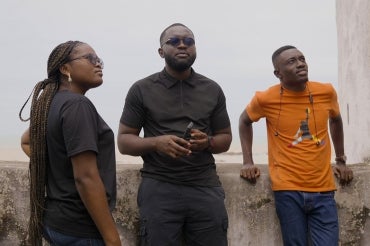U of T students dig into health risks of heavy metals in Ghana

From left to right: Dalla Lana School for Public Health students Emmanuella Avornyoh, Emmanuel Opoku-Mensah and Martin Bartels (photo courtesy of Heavy Risks)
Published: April 1, 2025
Martin Bartels remembers when the river that cuts through the Whin Valley region of Ghana ran clear, children played in the waters and fish could be seen from the bridge above.
Now, due to hazardous pesticides and pollution from illegal mining, the river is opaque, and the water is no longer safe.
Bartels, who grew up in the area, is one of three Mastercard Scholars at the University of Toronto’s Dalla Lana School of Public Health who explored the risks that illegal mining and hazardous chemicals pose to the Whin Valley region’s soil and community.
Taking what they learned in the classroom, Bartels and fellow scholars Emmanuella Avornyoh and Emmanuel Opoku-Mensah – all studying in the master’s in public health in occupational and environmental health program – sought research approaches that would work with the resources and structures in their home country.
“So, we see, OK, this is done in Canada, how can it apply in Ghana? Because we want to be helpful and relevant back at home,” Bartels says.
The trio’s work, which took place last year, is now being showcased in a recently released documentary called Heavy Risks, which highlights both the beauty and environmental public health challenges of the Whin Valley region. The doc follows the three researchers as they conduct a preliminary quantitative risk assessment (PQRA), measuring heavy metal levels in the soil and laying the groundwork for deeper research on the potential health risks for local farmers and residents.
The project is part of the Africa Health Collaborative, which is supported by the Mastercard Foundation and aims to transform health-care systems across Africa through partnerships – including with U of T.
Opoku-Mensah, who is also a physician, explains that, at certain levels, exposure to heavy metals can impact the brain, causing neurodevelopmental disorders in children and seizures in adults. Heavy metals can also cause kidney issues and impact liver function.
He has seen the health implications of illegal mining firsthand. Opoku-Mensah worked at a hospital in Ghana prior to coming to U of T. There, he says he saw patients with carbon dioxide poisoning due to mining machinery, injuries from collapsed mines and an increase in kidney issues in children from nearby communities.
“It was from there my interest in occupational and environmental health started,” he says.
During their fieldwork, the researchers found multiple heavy metals in the soil of the Whin Valley – some of which could impact the health of the soil and community if their levels continued to increase. As a result, the researchers determined that continuous soil monitoring and raising awareness about the environmental risks is essential for protecting the region.
“The connection between the environment, soil and health requires further exploration and increased awareness in Ghana,” says Avornyoh.
As part of their work, the researchers spoke with local farmers to raise awareness about the importance of wearing personal protective equipment when spraying pesticides and the risks of overusing pesticides. While the farmers were aware of the guidelines, Avornyoh says their conversations and research findings helped them further understand the risks.
“They were able to accept what we were trying to explain to them just because they felt connected to us,” Avornyoh says.
Bartels, Avornyoh and Opoku-Mensah noted that studying at the Dalla Lana School of Public Health has given them a new perspective on the multitude of factors that influence public health while shaping their future work in the field.
“Having been at Dalla Lana now, my horizon has been broadened,” says Opoku-Mensah. “When I see a patient or I read a case, my mind immediately goes to: how did this person’s experience contribute to what I’m seeing? It’s been very, very impactful for me.”



